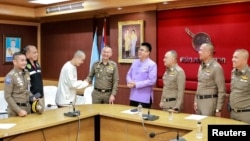Reports of Chinese citizens trafficked into scam centers along the Thai-Myanmar border are prompting renewed questions about Beijing’s reliance on Myanmar’s military regime to tackle transnational crime.
Analysts warn China’s strategy in Myanmar leaves citizens vulnerable while potentially bolstering criminal networks in the conflict-ridden Southeast Asia country.
Recent high-profile abduction cases have sparked outrage among the Chinese public, including the reported luring of Chinese actor Wang Xing to Myawaddy, a Thai-Myanmar border town, by scammers posing as film producers. Chinese embassies in Myanmar and Thailand have warned citizens about high-paying job offers that often lead to forced labor.
Thai officials reported that actor Wang Xing was trafficked into a scam syndicate operating in areas controlled by an ally of Myanmar’s military, the Karen Border Guard Force, or BGF.
Speaking to local media, Brigadier General Saw Maung Win of the BGF Battalion 3 confirmed that the BGF had handed Chinese actor Wang Xing over to Thai authorities but denied involvement in the trafficking, claiming only to have assisted in the rescue operation.
“These incidents involving Chinese citizens trafficked to Myawaddy are handled cautiously by Chinese authorities,” said Hla Kyaw Zaw, a China-Myanmar analyst. “But when action is required, China tends to pressure Thailand rather than directly addressing the situation in Myanmar.”
Jason Tower of the United States Institute of Peace echoed similar concerns.
“China’s support for the Myanmar military comes at great cost to its own population,” Tower said, referencing a publicly available database with close to 2,000 names of people across China who have gone missing in Myanmar in recent years.
Subsequently, Chinese Foreign Minister Wang Yi urged Southeast Asian nations to take decisive action against online gambling and telecom fraud, emphasizing the need for “relevant” countries to fulfill their responsibilities without explicitly naming Myanmar.
At a meeting with ASEAN envoys on Jan. 16, he highlighted the growing threat these crimes pose, particularly along the Thai-Myanmar border, which has endangered citizens of China and other countries.
Chinese and Thai police have jointly arrested 12 suspects connected to trafficking, with investigations ongoing and efforts underway to apprehend more suspects.
On Friday, China's Ministry of Public Security said it was “making every effort” to crack down on the scam compounds and “rescue trafficked people."
China’s ‘carrot’ approach
Tower said that China appears to favor a “carrot” approach in its dealings with Myanmar’s military.
In 2024, the Chinese Ministry of Public Security awarded its highest honor, the Golden Great Wall Commemorative Medal, to Myanmar’s home affairs minister, Lieutenant General Yar Pyae, for joint efforts against transnational crime. However, analysts argue that despite China’s support, Myanmar’s military focuses on territorial battles rather than combating scam operations.
According to Tower, Myanmar’s military lacks the capacity and the political will to address these syndicates effectively because the Myanmar military must rely on militia leader Saw Chit Thu to maintain control over Myawaddy, a crucial trade hub.
Saw Chit Thu, the leader of the BGF, has been sanctioned by the United States, United Kingdom and European Union for his role in protecting Chinese gangs and scam operations.
Scam networks reshuffle
China’s aggressive crackdowns on scam networks along its northern border with Myanmar in recent years have pushed many scam operations to relocate to Myawaddy, Karen State, far from Beijing’s immediate oversight. Unlike northern Myanmar, where China has exerted direct pressure, Myawaddy’s geographical distance and political dynamics pose unique challenges to Beijing.
Hla Kyaw Zaw said that China has seen some success in cracking down on online scams near its borders, but these efforts are largely localized. The measures have been less effective in other areas, such as Myawaddy, and scams continue to thrive.
“China closely monitors illegal activities in and around Myawaddy but depends on Thailand’s cooperation to address these issues,” Hla Kyaw Zaw said.
In response to VOA's inquiries regarding scam operations, the Chinese Embassy in Myanmar highlighted recent joint combat efforts by China and Myanmar against online scam operations.
According to the Chinese Embassy in Myanmar’s announcement on Tuesday, China will soon launch the second phase of its “Jingyao Joint Law Enforcement Operation” initiative, a multinational effort with Cambodia, Laos, Myanmar, Thailand and Vietnam to combat telecom fraud and transnational crime, following a first phase that resulted in over 70,000 arrests regionally and the rescue of 160 victims, mainly from northern Myanmar along the China border.
Social media uproar
Chinese actor Wang’s abduction sparked outrage on Chinese social media platforms, along with a growing database of families whose relatives have disappeared under similar circumstances.
A joint letter from the families of 174 people believed to be trapped in Myanmar went viral on China’s social media platform, Sina Weibo, on Jan. 9.
A political and strategic dilemma
As scam networks grow more sophisticated, analysts say Beijing faces a challenging balancing act between protecting its citizens and maintaining its strategic interests in Myanmar. Experts such as Tower are urging Beijing to reassess its priorities.
“China’s strategy is failing,” Tower argued. “The reality is, as you can see, how easily Chinese [civilians] are still trafficked into the Myanmar military Border Guard Force territory,” he said. “It’s not able to deal with these problems with the military.”
However, balancing crackdowns without destabilizing the Myanmar regime presents a challenge.
“China seems to be losing on both fronts,” Tower said. “This is a really tricky issue. On one hand, China doesn’t want the Myanmar military regime to collapse. And it recognizes that if it goes back to using that stick, it’s going to speed up the collapse of the Myanmar military.”





